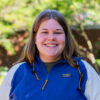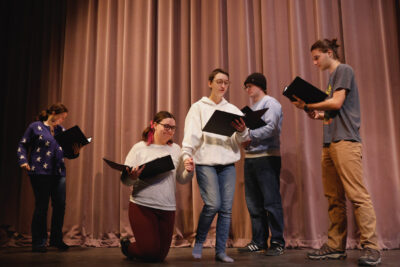On a sunny Sunday afternoon last week, Rieth Recital Hall was filled with chamber music as Goshen College’s Sherer Trio performed works by Beethoven and Brahms. The hall was filled with students and community members eager to attend.
Members of the trio include Matthew Hill, Solomia Soroka and Dato Machivariani — all music professors at GC.Machivariani teaches applied cello at Valparaiso University along with GC. Soroka teaches private violin lessons, music theory and chamber music. Hill is faculty chair and music department chair in addition to his responsibilities teaching applied piano lessons and various other classes around the music center.
The trio was created in the memory of Lon Sherer, who was a GC music and violin professor for 39 years.
During his lifetime, Sherer experienced an acoustic tumor that was expected to be career-ending due to loss of nerve and muscle control and partial hearing loss on his right side.
After five years, he was able to recover his playing technique with help from Shin’ichi Suzuki, a well-known pedagogue who developed a method to teach music like language to young children.
Because of his experiences, Sherer wrote “Practicing: A Liturgy of Self-Learning,” a book that describes practice time as sacred.
Though many current GC students never knew Lon Sherer, his legacy lives on in the music program.
The trio has taken on his name and has created the Sherer International Violin and Piano Competition that is held annually at GC for young students from across the globe.
The Sunday program opened with a striking performance of Beethoven’s Sonata No. 9, commonly known as the Kreutzer Sonata, by Hill and Soroka. Audience members were drawn in by the talent exhibited, and the composition left them on the edge of their seats.
After a break, Brahms’ Piano Quintet in F minor was played with the help of some guest musicians. The composition was a step in Brahms’ compositional development toward writing pieces for a full orchestra, so the production as a whole was engaging and included a full sound from the Romantic period of music.
Some of the audience members that were present during the performance were some of Soroka’s Advanced Music Theory students.
Since the students were beginning to look at compositions and composers from the Romantic period, it made sense to have them analyze the concert as their work for a midterm examination.
“I loved having a front row seat to the Sherer performance; it was breathtaking,” said Advanced Music Theory student Sasha Dyck, a social work and music double major.
“It was especially neat seeing Solomia perform, since we’re used to seeing her in the classroom setting. When I attend faculty concerts, I’m blown away by the immense talent of our music professors, and it makes me feel grateful to have the privilege to study with them!”



